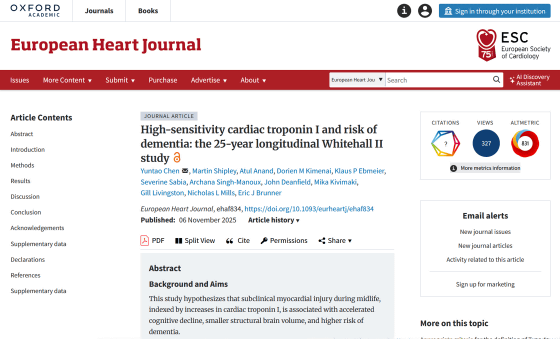Research results show that people with poor 'middle-aged heart health' are at higher risk of developing dementia in the future

At first glance, the brain and heart seem like completely separate organs, but a new study that followed nearly 6,000 adults for 25 years has revealed that 'midlife heart health' is linked to future dementia risk.
High-sensitivity cardiac troponin I and risk of dementia: the 25-year longitudinal Whitehall II study | European Heart Journal | Oxford Academic

Poor heart health in middle age linked to dementia in old age – new study
https://theconversation.com/poor-heart-health-in-middle-age-linked-to-dementia-in-old-age-new-study-269324
A British research team analyzed data from Whitehall II , a follow-up study of British civil servants, to examine the relationship between heart health and future dementia risk.
The approximately 6,000 participants were tested for their levels of a protein called cardiac troponin I, which is released into the blood when heart cells are damaged, at baseline between 1997 and 1999. Cardiac troponin I can be measured with a standard blood test and can be detected in very small amounts, far below the levels seen in heart attacks.
The participants, who were aged 45 to 69 at baseline, were followed until March 2023, with their cognitive function regularly assessed. During a median follow-up period of 24.8 years, 606 participants, or approximately 10% of the participants, were diagnosed with dementia.

The analysis showed that people with higher cardiac troponin I levels in middle age were more likely to develop dementia than those with lower levels.
Even after taking into account age, sex, blood pressure, cholesterol levels, diabetes, and other heart disease risk factors, the risk of dementia increased by 10% for every doubling of cardiac troponin I levels. Particularly in middle-aged subjects with cardiac troponin I levels above 5.2 ng/L had a 38% higher risk of dementia compared with subjects with cardiac troponin I levels below 2.5 ng/L.
MRI scans of 641 subjects 15 years after the start of the study revealed that the group with the highest levels of cardiac troponin I in middle age had smaller brain
They also found that people with higher cardiac troponin I levels in middle age also had a more rapid decline in memory and reasoning abilities. Those with the highest levels of cardiac troponin I in middle age were reported to have experienced approximately two years of advanced cognitive decline at age 90 compared with those with the lowest levels.

Regarding why midlife heart health is useful for predicting future dementia risk,David Gaze, a senior lecturer in chemical pathology at the University of Westminster who was not involved in the paper, points out, 'The answer lies in the circulatory system. The brain relies on a constant, abundant blood supply. When the heart's pumping function declines or arteries become hardened and narrowed due to atherosclerosis, the brain's network of tiny blood vessels becomes oxygen-deprived. This chronic, low-level damage can accelerate the processes that lead to dementia.'
The results of this study support the findings of several previously reported studies. A 2024 report by the Lancet Dementia Commission estimated that 17% of dementia cases could be prevented or delayed by efforts to improve cardiovascular health, such as controlling blood pressure and cholesterol levels, maintaining vigorous physical activity, and avoiding smoking and excessive alcohol consumption. Additionally, a 2019 study analyzing data from the Whitehall II study showed that people with good cardiovascular health at age 50 were less likely to develop dementia 25 years later.
'The level of cardiac troponin I varies depending on factors such as age, kidney function, and strenuous exercise, so a high level does not necessarily mean that dementia will develop. Still, the idea that a blood test in middle age could identify people at high risk of dementia in the future is appealing,' Gaze argued.
Related Posts:
in Free Member, Science, Posted by log1h_ik







